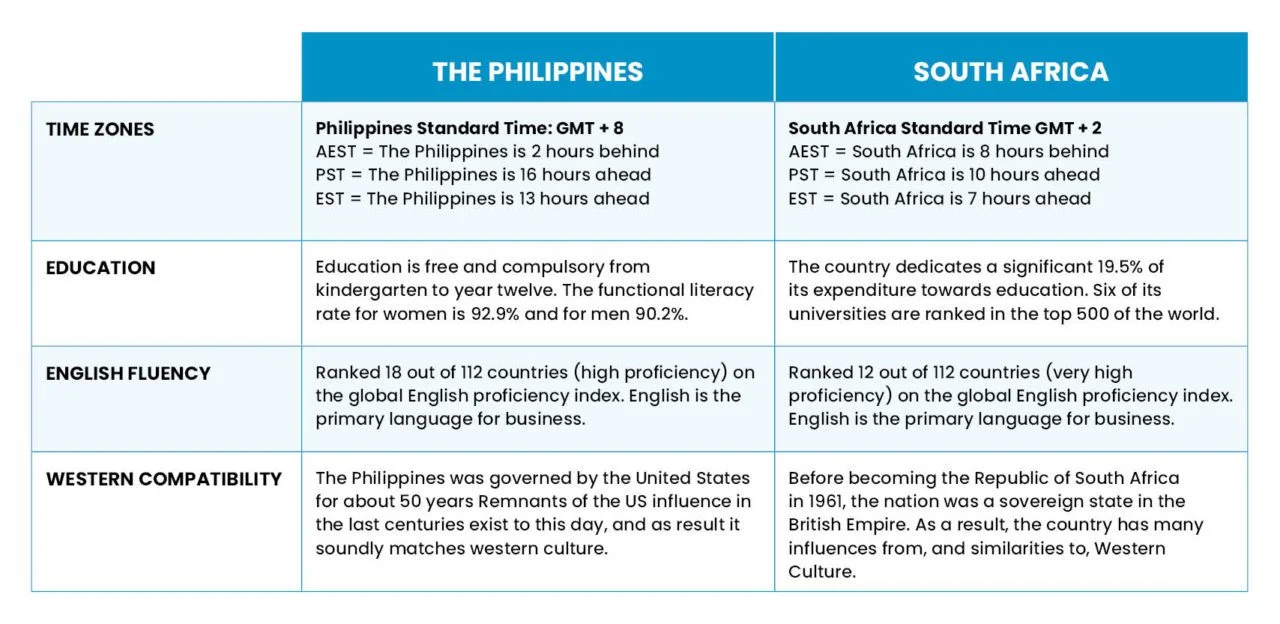England and Australia have something in common: it is a challenge to hire locally. Good thing offshore outsourcing has emerged as a strong solution. In the world of offshore outsourcing, your potential talent pool is no longer restricted to just one country. You can find the right people anywhere.
For the most part, you can manage to find offshore teams that work the same hours as you. Locations like the Philippines are a great fit for Australian businesses, and South Africa for those in the United States. The time differences are not major, and staff are happy to adjust to most of your regular work hours.
However, there are instances where your offshore teams will work at vastly different times. For example, you may need staff working while you sleep to provide round-the-clock customer service. You may opt to try a different country’s talent pool if you cannot find a fit closer to home, or if they have a higher calibre of staff in the role you are hiring for.
It all comes down to practicality. Certain roles should be within your time zone to be effective, such as a virtual admin assistant or receptionist. However, for roles like an SEO specialist or outsourced bookkeeping specialist, time zone is not a critical factor. In these instances, it is common to outsource to someone with the right skill set who works different hours to your own.
At Staff Domain, we provide clients with highly skilled full-time, dedicated manpower of their choosing in the Philippines and South Africa. Both locations are home to a large talent pool of experienced professionals with fluent English-speaking skills, great work ethics, and cultural compatibility with Western nations. So, wherever you choose, you can be sure to work with highly qualified and capable professionals.

The 24/7 Advantage
One of the greatest advantages of offshore outsourcing to a different time zone is that you are enabling your business to operate 24/7/365. This approach is also known as “following the sun.”
Businesses in tech, logistics, e-commerce and customer service would greatly benefit from the 24/7 support offshoring entails. For managed service providers (MSPs), ‘level of support’ is the most important factor for customers. The top two reasons why a customer would switch from one provider to another are lack of responsiveness (74%) and failure to meet KPIs (69%).
Managing offshore teams will allow your services to cross boundaries. You can get the right fit for your business’s time zone to provide round-the-clock, excellent customer experiences.
Having 24/7 manpower offshore can be beneficial for your business even if it is not a requirement. You will get to start every day a step ahead. For instance, having a graphic designer or digital marketer work the night shift means you can send a brief or task today, and wake up to it complete first thing tomorrow.
Won’t I lose control of my staff if they are in a different time zone?

How will I know if my staff are working?
The same way you would trust anyone working locally – your outsourced team meets KPIs, delivers important outcomes, and is responsive to emails and calls during their work hours. The fact that your staff are 100% on your team – and your team only – means their work hours are all yours. At Staff Domain, we help our clients find full-time dedicated staff. You would not share your local staff with other businesses, and we would not share your offshore staff.
5 Tips to help you manage different time zones
Whether you find staff in a time zone close to yours, or decide you need or want staff working different hours – your offshoring experience should be seamless. Here are tips to help you manage your workforce’s time zone differences:
1. Make the most of cross-over hours.
When you work across different time zones, finding time to collaborate and communicate can be tricky. But do not think that means you will never meet or see your staff!
If you have staff working through your night, it is a matter of start vs finish. For example, if you are in Australia, your staff in South Africa would start at 8 am, as you finish at 4 pm. Or if you are on the US East Coast, your staff in the Philippines would begin at 8 am as you finish at 5 pm.
Having a communication plan in place is key to making the most of this cross-over period. Book a daily meeting in your calendar for this time. This will allow you to work through any problems, ask and answer questions, and make sure your staff is on track. If daily is not practical for your business, make sure to meet at least once a week.
2. Project management and collaboration software are keys to success.
Ensure your business is set up with project management tools to help your staff understand their tasks, and for you to keep track of their workload. There is a range of software available on the market, such as Trello or Microsoft Planner. These programs will allow you to assign tasks, track progress, and manage comments and questions.
3. Do not underestimate the simplest of tools.
Some of the simplest tools are the most important. First up – a world clock. Keep a world clock or a time zone calculator bookmarked on your browser. You will be surprised how often you might confuse yourself with the difference. If your business has multiple members in different time zones, one tool that might be helpful is TimeZone.io. It provides a visual of all your team members, and their where and when. Another simple but important tool is the scheduling function on your email client. No one likes to be bothered out of hours. Schedule your emails to be delivered as your staff starts work.
4. Encourage your staff to get involved in the office.
If your team is working while you are sleeping, there is a lot of time with no team communication, which can feel isolating. At Staff Domain, we offer regular training, group activities and wellness programs for your offshore staff. This is to help them feel happy and engaged. Encourage your team to get involved when the time zone permits; include them in your own Friday night drinks!
5. Invest in training from the very start.
Set your team up for success from the get-go. Adequate training is critical to ensuring the smooth running of your offshore team. Your new staff must understand your best practices, systems, workflows, and expectations. This way, they can be confident in their role whether they work the same hours or not. Great training starts with having a thorough manual and induction program for your employees. If you need help with this process, a good offshoring provider should be able to guide you through it.
Get started today – we are here for you 24/7
Staff Domain‘s offshore outsourcing solutions connect your business to a highly experienced global talent pool for game-changing results. Effortlessly manage your offshore workforce with our comprehensive compliance, payroll, and HR support, and benefit from fixed, transparent pricing in your local currency. Contact us today or schedule a meeting with our sales team to quickly source the right offshore team for your business.
FAQs
How can businesses ensure effective collaboration among offshore teams in different time zones?
Establish overlapping work hours to allow for real-time communication and virtual meetings. Using technology such as collaboration tools, project management software, and video conferencing platforms improves communication and supports effective workflow management. Establishing clear communication protocols, such as response times and preferred contact channels, helps to close communication gaps and assures agreement on project objectives and deliverables.
How does managing offshore teams impact productivity and efficiency?
Managing offshore staff across various time zones can greatly improve organisational productivity and efficiency. Businesses that use round-the-clock operations can maximise task completion and shorten project durations. Accessing global talent with specific skills and experience leads to more innovative solutions and better decision-making processes.
What are the strategic benefits of integrating offshore teams into business continuity planning?
Integrating offshore staff into business continuity plans improves organisational resilience and disaster recovery capabilities. Diversifying operational risks across various sites reduces disruptions and supports the continuance of important business services during emergencies or unexpected events. Strong systems and backup plans with offshore staff increase operational flexibility and adaptation to changing market conditions.
How can businesses measure the success and ROI of managing offshore teams?
Productivity levels, project delivery success, deliverable quality, and customer satisfaction ratings are all metrics that provide insight into operational performance and offshoring success. By conducting frequent performance reviews, asking for stakeholder feedback, and benchmarking against industry benchmarks, firms can measure the impact of offshore outsourcing on organisational growth, profitability, and competitive advantage. Adopting a data-driven approach to ROI analysis allows for more informed decision-making, finds areas for improvement, and improves offshoring tactics to maximise business value and long-term performance.









